Jin Daxia=the supreme king of martial arts?
[Exploring the World of Jin Yong’s Martial Arts] 2 Why did Jin Yong stand out?
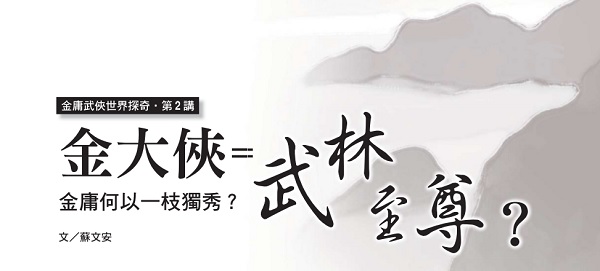
In the previous lecture, we pointed out to readers what the appeal of martial arts novels is, and then we asked: Why can Jin Yong’s works stand out among many modern martial arts novels? Since there was Wang Dulu (1909~1977) earlier, then there were Liang Yusheng (1924~2009), Gu Long (1936~1985), Zhuge Qingyun (1926~1996), Sima Ling (1933~1987), and Ni Kuang (born in 1935) , and even the younger generation Wen Ruian (born in 1954), Huang Yi (born in 1952) and others are diligently creating, why is the "brand" of Jin Yong the only one so popular?
The author believes that the most critical reason is of course: Jin Yong has indeed achieved a high degree of literary and artistic achievements. Secondly, in addition to the good luck of fate, it must be the extremely clever marketing and promotion strategies of the publisher and Jin Yong himself. Let’s analyze it for readers as follows -
Feature 1 Appreciation for both refined and popular tastes
When scholars analyze the narrative style of "The Romance of the Three Kingdoms", they often summarize it with the words "the writing is not very profound and the language is not very vulgar". Who would say it is inappropriate to apply this comment to Jin Yong’s martial arts works? Mr. Chen Mo, the author of "Appreciation of Jin Yong" analyzed it this way -
The advantage of Jin Yong's novels lies in that they are both vulgar and elegant, both popular and profound, both "lively" and "knowledgeable", both bizarre and real; they can not only satisfy people's entertainment requirements, but also allow them to appreciate its rich aesthetics and Philosophical meaning; it is not only an "adult fairy tale" about martial arts legends, but also a profound allegory about life and the world.
As the saying goes: "Insiders watch the door, and laymen watch the excitement." The so-called "appreciation of both elegance and popular culture" means that both "insiders" and "laymen" can get what they need. There is not only "fun" to watch, but also "doorway". "Rewardable." Jin Yong's martial arts works are indeed both beautiful and long-lasting, and you will still enjoy them no matter how many times you read them. This is true no matter how the subsequent martial arts authors "add color and flavor" to their novels and incorporate a lot of New Age and erotic elements into their novels. Elements, still can’t compare!
Feature 2: vivid and profound characters
Chen Mo emphasized:
On the surface, Jin Yong's works are no different from other martial arts novels. They have all the characteristics that any martial arts novel should have, such as tension, twists and turns, suspense, martial arts fighting, chivalry, revenge, lingering love, etc., etc. In other words, Jin Yong's novels, like other martial arts novels, are "lively" and "twisting", and therefore "good-looking".
Jin Yong himself often said that the reason why he wrote martial arts novels was mainly to "entertain himself and entertain others." This means that "entertainment" comes first.
However, in addition to satisfying readers' needs for leisure and entertainment, Jin Yong's martial arts works also bring profound enlightenment to readers. The key lies in the profound and vivid description of the characters. The characters in Jin Yong's martial arts world are not "flat" characters with vague faces, formulas, and labels, but "round" characters with evil in good and good in evil, who can change and grow, and have a rich inner world. .
For example: Huang Yaoshi, the owner of Peach Blossom Island in "The Legend of the Condor Heroes", is obviously not a bad person, but because of his withdrawn and willful character, he repeatedly makes decisions that he regrets, leading to a series of tragedies for himself and others; "The Legend of the Condor Heroes" Guo Jing and Huang Rong in "The Swordsman" obviously wanted to be good for Yang Guo, but they both forced him to become more deviant due to their wishful thinking. Yue Buqun in "The Swordsman" came from a well-known and upright family, and became the head of the generation, but because of his opposition to His endless greed for fame, fortune, status, and martial arts led him to fall into the abyss step by step, and he became the most abominable hypocrite; another character in the book, Tian Boguang, was originally a flower-picking thief that everyone wanted to beat, but under the inspiration of Linghu Chong, he revealed his true sense of justice. The faithful side.
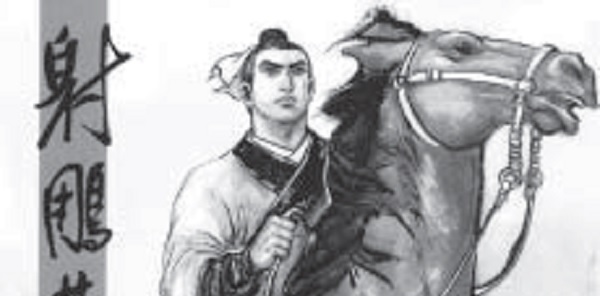
▲The world of martial arts written by Jin Yong is not limited to individual "single fights", but also involves national wars involving thousands of troops. The picture shows the picture book "The Legend of the Condor Heroes".
Another example: The "Four Evil Men" in "Dragon" all appear to be murderous without blinking an eye, but they have soft sides that are hidden deep inside; Murong Fu in the book was originally a handsome and handsome young hero. However, because of his insistence on pursuing the illusory dream of rejuvenation, he lost his lovers, friends, and finally lost himself; Hua Tiegan, known as the "Hero of the Central Plains" in "The Legend of the Central Plains", was exposed because he could not bear a series of mistakes, setbacks, and crises. Wei Xiaobao in "The Deer and the Cauldron" reveals his true nature of being greedy for life and fearful of death, shameless, cowardly yet courageous, selfish yet loyal, frivolous yet true-hearted, uneducated yet knowledgeable yet insightful...
What I personally admire the most is that in "The Legend of the Condor Heroes", Yang Guo transforms from a cynical delinquent into the "Condor Hero" that everyone sincerely admires. After going astray several times and engaging in fierce battles between heaven and man, this son finally faced and admitted step by step the fact that his late father was a treacherous and evil person. He broke away from the common martial arts novels in which "if the father's hatred is not avenged, it will be in vain." He insisted on calling himself "son of man", forgave all the enemies who killed his father, and resolved to act chivalrously and righteously to make up for his father's fault. This "little beggar who had good times and bad days finally grew into a man who was upright and upright." The repeated process was described by Jin Yong in an extremely profound, sincere and touching way!
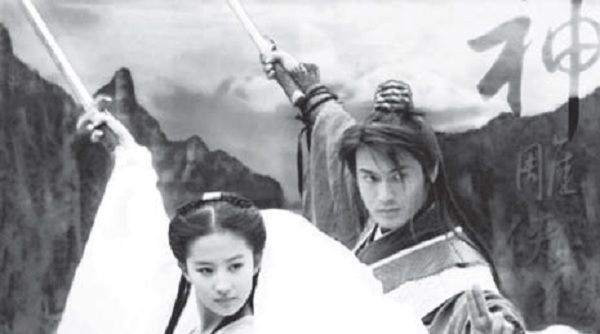
▲The popular and enviable "hero couple" created by Jin Yong - Yang Guo and Xiao Longnu (new version of the TV series "The Legend of the Condor Heroes").
In addition, Guo Jing, Huang Rong, Hong Qigong, Ouyang Feng, Huang Yaoshi, Master Yideng, Zhou Botong, Mei Chaofeng, Yang Guo, Xiao Longnu, Zhang Wuji, Zhou Zhiruo, Duan Yu, Qiao Feng, Jiumozhi, Linghu Chong, Wei Xiaobao and other characters , there are both good and bad, some are neither good nor evil, half good and half evil, and both good and evil. However, in the minds of "Jin fans" who are familiar with Jin Yong's martial arts world, they are like old friends who have known each other for decades. Their character, experience, and martial arts skills are all treasures from countless families, and they will never be used in public.
Jin Yong also created several popular "heroic couples", such as Guo Jing and Huang Rong, Yang Guo and Xiao Longnu, Linghu Chong and Ren Yingying, Zhang Wuji and Zhao Min, Duan Yu and Wang Yuyan, etc., integrating the waves of love between men and women with the turmoil of martial arts. One furnace. As Mr. Nan Fan said:
Therefore, when competing for the top spot of the martial arts leader, there may be a period of years of secret longing fermenting into a powerful driving force; in the bloody storm of cleaning up the family, there may be hidden the turbulent jealousy caused by a broken love.
It is a pity that many new martial arts authors specialize in writing articles about the love between men and women. Their exaggerated and erotic descriptions of stealing love and beauty are far better than the profound presentation of life and human nature. Mr. Nan Fan believes that this is called "the patch is bigger than the pants", which is putting the cart before the horse and taking over the subject!
Feature 3: Clever combination of legend and history
What Jin Yong wanted to write was not just the love and hatred in the world, but the heroic epic of ancient China. Most of his martial arts novels have clear historical dates and backgrounds (please refer to the chart "Jin Yong's Martial Arts World Bird's Eye View" in Lecture 1 of Issue 23 of this magazine), real people (historical figures) and false stories (from legends, unofficial histories or Jin Yong's own creations). ) are melted into one furnace, the truth is also an illusion, and the illusion is also true. It makes those who are familiar with Chinese history half-believed and half-believed, and those who are not familiar with historical facts believe it to be true.
Commentators believe:
It is precisely because of the "historical feelings" and the "eyes of humanity" that Jin Yong's novels have evolved from "big scenes" to "grand momentum" to "big minds" to "big realms" and "generous writing". ...The martial arts "kingdoms" and "temples" (that is, history and politics) in his works are not limited to "single fights", but involve national wars with thousands of troops (Su's Press: "Shooting the Condor", "The Gods") Four books including "Diao", "Yitian" and "Tianlong" are especially the best among them). Therefore, the scene is huge, there are many clues, the vision is extremely broad, the mind is extremely broad, and the momentum is extremely strong!
This kind of "atmosphere" is not something that ordinary martial arts novel authors can match. When the author was in elementary school, he spent two years reading a martial arts novel serialized in Tainan's "China Daily" every day. However, the scene was too big and there were too many characters, and the author (whose name is withheld) couldn't handle it. In the end, A large group fight was arranged, everyone killed each other, and the few who survived went crazy, and actually jumped off the cliff to commit suicide... When I think about it to this day, I still feel resentful.
Jin Yong's masterpiece that combines history and legend is undoubtedly "The Deer and the Cauldron". When Kangxi was young, he killed the powerful minister Obai and established his throne. He even pacified the three vassals, established Taiwan, and signed the Treaty of Nerchinsk between China and Russia... The little gangster Wei Xiaobao played a decisive role in fighting against all odds. Let’s take a look at the American movie “Forrest Gump”, which won the 1994 Oscar for Best Picture and Best Actor. The protagonist Forrest Gump, played by Tom Hanks, made his debut in Elvis Presley and American Football. The most legendary events in history, the anti-Vietnam War demonstrations in Washington, the US-China Ping Pong diplomacy, the Nixon Watergate Incident and other historical scenes are all involved. It can be said that Wei Xiaobao in the seventeenth century is one West, one China, one modern and one ancient. Reflect each other.
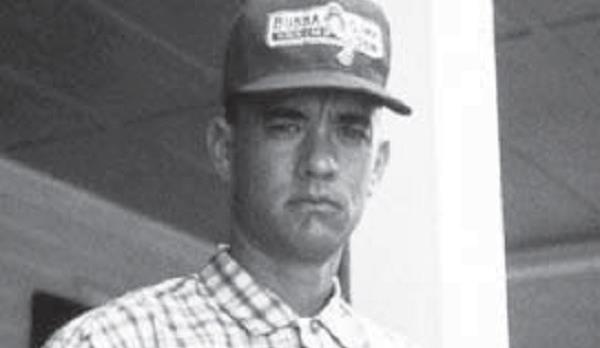
▲Forrest Gump in the movie has experienced multiple historical events, and he and Wei Xiaobao in the seventeenth century can be said to be one West, one China, one modern and one ancient, reflecting each other.
In Jin's wonderful writing, Wei Xiaobao even stopped at "Diaoyutai", a small island that has been the focus of disputes between China and Japan in recent years, which "proves" that the sovereignty of this island has belonged to China more than 300 years ago. Some people say that Jin Yong's subtext is a metaphor for national events, and even international events, which often seem complicated. In fact, as long as you have a thick skin, a dark conscience, and go rogue to the end, most of them can be solved. As the saying goes: On the surface, they are sanctimonious and polite, but in their hearts they are just predatory and hooligan behavior. Some commentators believe that the more than 200,000 emails exchanged between U.S. diplomats and the U.S. State Department revealed by the WikiLeaks website in December 2010 also prove that this statement is true!
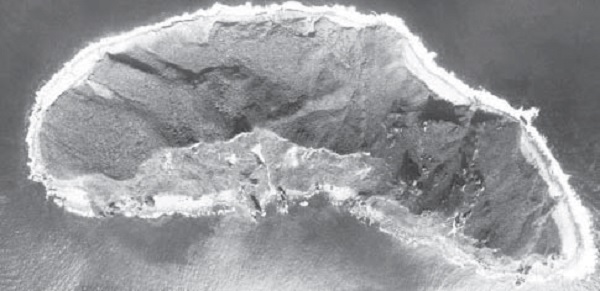
▲In Jin's wonderful writing, Wei Xiaobao even stopped at "Diaoyutai", a small island that has been controversial between China and Japan in recent years!
Feature 4: Superb martial arts
Of course, martial arts novels must contain martial arts. Compared with the martial arts masters described in Jin Yong's works, where form and meaning are intertwined, nature and man are one, and flying flowers and falling leaves can injure people, music, chess, calligraphy and painting all contain rich martial arts connotations, "using martial arts to participate in Zen" or "using Zen to prove martial arts" In this realm, Western boxing and wrestling are just muscle exercises to exercise strength and speed. However, looking back at the martial arts in many Chinese martial arts novels, they are either rigid or absurd, or plagiarized and repetitive... and their artistry and originality are quite lacking. The martial arts written by Jin Yong are as praised by commentators as "poetic", "philosophical" and "characteristic", thus becoming a major attraction in Jin Yong's martial arts world.
The so-called "poetic" means that most of them have names full of poetic or aesthetic taste: such as "Hundred Flowers Fist", "Tang Poetry Sword Technique", "Sadly Ecstasy Palm", "Purple Yang Magic", etc., and such as "Qiankun Da "Shift", "Lingbo Weibu", "Xiaoyaozhang", etc., all make people laugh or be fascinated when reading it.
The so-called "philosophicalization" refers to the "martial arts" contained in many martial arts moves in Jin Yong's novels, which are derived from the application of Chinese philosophy. For example, the magic of "plausibility and surprise" in "Hundred Flowers Mistaken Fist"; another example is Zhang Sanfeng's teaching of Tai Chi sword to "obtain the sword's intention and forget the sword's moves" and so on.
As for "characterization", it means that in Jin Yong's novels, martial arts methods often complement the characters' personalities. It can be said that Jin Yong arranged for them to "practice" according to their personalities. For example: the blunt and simple Guo Jing learned the concise and vigorous "Eighteen Dragon Subduing Palms"; the childlike Zhou Botong learned the "Kong Ming Fist" that uses both hands to attack each other; and the sinister and vicious Ouyang Feng Then he practiced the "Nine Yin Sutra" in a retrograde way; of course the pure and pure Xiao Longnu practiced the "Jade Girl Heart Sutra"; Wei Xiaobao, who was slippery, cunning and as timid as a mouse, did not practice the "Divine Action Hundred Changes" (he claimed to be the "Divine Action"). "Escape") What else can you practice?
Feature 5: Constantly rewriting and revising
Finally, there is another extremely unique feature of Jin Yong's martial arts works, which is that "it has been completed, and it has been continuously and significantly rewritten and revised."
Jin Yong began serializing "Books and Swords" in Hong Kong's "New Evening News" in 1955, and published the last chapter of "The Deer and the Cauldron" on September 23, 1972. In seventeen years, he completed fifteen works (see the previous lecture) The attached chart "Jin Yong's Bird's Eye View of the World of Martial Arts") was compiled by Jin Yong into two verses of the poem "The flying snow shoots the white deer, the laughing book hero leans on the blue mandarin duck" ("Yue Nu Sword" is not included).
After "The Deer and the Cauldron" was completed, Jin Daxia announced that he would "wash his hands and withdraw from the world" and would no longer write martial arts novels. In fact, because he was constantly revising, he "retired and never stopped." As for "closing the pen", it appears to be humility, but in fact it is pride. Gein "Jin Daxia" believes that his artistic achievements in the world of martial arts novels have reached the pinnacle, and it is impossible for him or others to reach higher levels.
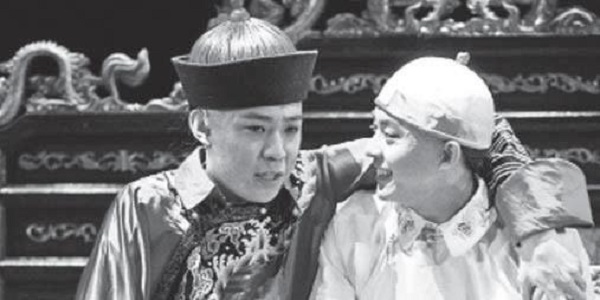
▲Wei Xiaobao, who travels around various places, is as slippery, cunning and as timid as a mouse, and he has developed the kung fu of "Escape in a Hundred Times" (The Deer and the Cauldron stage stills, photos taken from the Internet).
These fifteen works were originally published in Hong Kong newspaper supplements. Long-form martial arts works are often serialized for more than two or three years. Because they only write a short paragraph every day, they are easily affected by the social, political, and economic trends around the author at that time, and even the trivial matters in life. Legend has it that the author of a martial arts novel once went on vacation while his work was being serialized, and the newspaper hired someone to ghostwrite it. The knife-catcher was jealous of his popularity, so he arranged for his mortal enemy to stab the protagonist to death with a sword. The author came back from his vacation and wrote calmly that when the protagonist woke up, it turned out to be a nightmare...
When Jin Yong serialized "Swordsman", mainland China was suffering from the catastrophe of the Cultural Revolution. Critics believed that the main characters in the book, such as Zuo Lengchan, Yue Buqun, Ren Woxing, Xiang Wentian, Dongfang Bubai, Linghu Chong, etc., as well as The demon sect's god-making movement, its reuse of the youth corps, and the massacre of its founding fathers, etc., could all be "matched" by the prominent figures and key events in China's political circles at that time.
All these factors led Jin Yong to spend a lot of time rewriting and revising the novel when it was serialized and compiled into a book, so as to ensure the integrity of the structure, the smooth development of the plot, and the reasonable process of character formation.
The first wave of large-scale revisions began in March 1970 and ended in mid-1980, lasting a full ten years, which shows the depth of his efforts. Taiwan and the Mainland both lifted the ban around the time the first revision was completed, and the complete works of Jin Yong, compiled into a series of books, immediately became popular in the Chinese world.
Around 2001, another wave of revision projects was started based on questions, comments, suggestions from scholars, readers and netizens, and even online referendums, and new editions were launched one after another starting in 2003. When each latest revised version is released, it becomes hot news in the current affairs, entertainment, and local editions of newspapers and magazines on the Internet. Millions of "gold fans" are fascinated by the details of each character's experience, martial arts, and inner drama. There is no "money must be compared" and there will be endless discussions.
It goes without saying that the promotional effect of this overwhelming, automatic and free publicity is huge. In the latest revised version, Ewing rewrote some details of the love history of Huang Yaoshi in "The Condor", Zhang Wuji in "The Sky", and Duan Yu in "The Dragon", which caused extremely intense responses and debates among "gold fans". Jin Yong joked that if 60,000 readers took to the streets, he would make revisions based on their opinions. Another saying that "Jin Da Xia" talks about "600,000 people" rather than "60,000 people." This also shows how amazing the number of "gold fans" is!
Jin Yong’s Works: Popular or Classic?
If it was said that the works serialized in newspapers were purely leisure and entertainment works, today, after the test of time and the severe test of the ever-changing, fast-moving publishing market, Jin Yong's martial arts works have been confirmed to be wonders in the history of Chinese literature. Some scholars even argue that Jin Yong's novels can undoubtedly be ranked among the masterpieces of Chinese classic literature.
Could it be that a writer’s definition of classic literature is: 1. Possessing great wisdom to explore the human condition; 2. Being able to think about life in a macroscopic way; 3. Beautiful writing; 4. The work has a realm; 5. It is the carrier of contemporary history and culture. Taste.
It is generally recognized that Jin Yong’s seven middle-term works, including "The Legend of the Condor Heroes", "The Legend of the Condor Heroes", "The Legend of Heaven and the Dragon Sword", and his later works, "The Legend of the Condor Heroes", "The Swordsman", "The Journey of the Knight", and "The Deer and the Cauldron". It is the best among fifteen works. As for me personally, I think "Shoot" is the most magical about martial arts; "Laughter" is the most profound about human nature; "God" is the most romantic about love; and "Deer" is the most amazing about history.
The influence and popularity of Jin Yong's martial arts works are still in the ascendant today, nearly 40 years after he put pen to paper. If a reader was twenty-five years old in 1955, and his descendants were also "gold fans", they might already be the fourth generation. ─Such examples are indeed common! According to the author's personal contact, there are a large number of second-generation Chinese immigrants (the so-called ABC) who are now in their thirties and forties and were born and raised in North America, or the "1.5 generation" who were born in China, Hong Kong and Taiwan and grew up in North America (the so-called OBC). , the reason why he can still speak fluent Chinese is definitely related to watching Jin Yong’s martial arts series one after another with his parents since he was a child.
The reason why "Jin Yong's popularity" can always remain high is that according to the author's observation, each of his novels is remade into a new TV series every few years, which can be said to "take the credit but the greatest credit". ─As the mainland opens up day by day, the deserts, five mountains, famous mountains, river sources, frontier fortresses, ancient cities, and prairie that could only be dreamed of in the past have now come into view one by one; with the breakthrough of computer technology, in the past, subduing the dragon could only be done by imagination. The Eighteen Palms, the Great Shift of the Universe, the Nine-Yang Manual, the Nine-Yin Manual, the Dog Beating Stick Technique, the magical power of snapping fingers, the One-Yang Finger... and so on, are now presented to the audience one by one. All these are equivalent to continuously injecting new elements and new charm into Jin Yong's martial arts world. The author's only regret is that in the many versions of "The Legend of the Condor Heroes" series or movies, I have yet to see the divine eagle that matches my imagination. On the contrary, in the 2009 Hollywood movie "Avatar", the psychic flying beasts ridden by Na'vi warriors are comparable.

▲The divine eagle in the author's mind is actually comparable to the psychic flying beast ridden by the Na'vi warriors in the movie "Avatar".
Starting from the next lecture, let us take a look. As Christian readers, what issues of life and faith can we associate with such a widely watched and deeply rooted martial arts work by Jin Yong, so as to have a dialogue with the majority of Chinese compatriots?In fact, Reverend Chan Choi, a senior figure in Hong Kong, had already foresighted this more than 20 years ago and wrote a series of books. The author is just carrying it forward.
 Author profile
Author profile
Su Wen'an has a thorough understanding of Jin Yong's complete works. He is familiar with Journey to the West, Red Mansions, Three Kingdoms, and Water Margin. He is familiar with numerous movies and TV series from China, Hong Kong, Taiwan, Japan, Korea, the United States, and Europe. He carefully extracts their essence based on biblical truth and integrates them into writing, editing, and classroom.
Pastor Su Wen'an also likes to combine family and literary ministry, and is often invited to serve as a lecturer for families or literary camps in various places. He emphasizes that "workers come before work, authors are more important than works, and sincerity is better than everything else."
